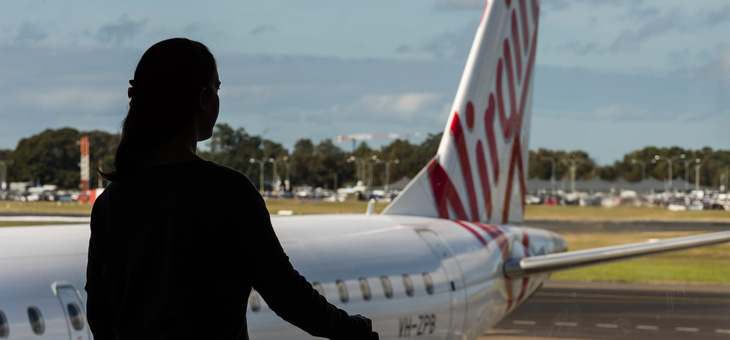Is Virgin in trouble? There are some moderately disturbing signs that suggest Australia’s ‘number two’ airline may be. One industry insider suggests that the airline should go back to being a budget airline to turn its fortunes around.
In what is interpreted as a warning sign for the struggling carrier, Virgin chief Paul Scurrah reportedly sent an internal memo earlier this month saying the company would pause or halt any new projects in a bid to return the airline to profit, according to The New Daily.
The company has already flagged a $35 million full-year loss, which will constitute the seventh consecutive year of losses for the carrier.
Mr Scurrah “openly stated he has a commitment to return the business to profitability” which involved “looking at the priorities for the business and a review is being conducted across a number of areas”.
What the experts say
Aviation expert Neil Hansford believes Virgin could change its fortunes by returning to its roots as a low-cost airline instead of competing with Qantas.
“If they [Virgin] had just stayed where they were as a Jetstar, they would not have lost the billions they lost,” said Mr Hansford.
“They wanted to be a new Ansett, which wasn’t so bad when they were chasing the economy market, but they decided to walk away from that low-cost model and chase the business market.
“I wouldn’t spend my time and money chasing Qantas in the premium market – get rid of the lounges, do away with Tiger and reorientate the airline to what it was good at, which is low fares and a well-marketed, timely economy airline.
“Get out of those big-bodied jets and stop flying to [the likes of] Hawaii. Just go and run domestic and regional flights and give real value … to those people who don’t want to fly business. Just stick with shorter-haul sectors like Fiji, Bali, Vanuatu and New Zealand.”
But another aviation and tourism expert, Dr David Beirman, says Virgin should ramp up efforts to take on Qantas and spend some time fixing its budget offering, Tigerair.
“I actually think going back to being a low-cost carrier would be a disaster. First, they need to enhance the reputation of Tigerair [Australia] to maintain that low-cost carrier brand. Tigerair is still struggling to overcome the bad reputation it earned when it started out,” said Dr Beirman.
“[And] they should look seriously at China, and one of the big markets flagged by Tourism Australia is India, which is the fastest-growing inbound market.”
Virgin valiantly persists with its Velocity program
One of the battles Virgin might never win is its loyalty program. Qantas just has too strong a hold over the market. According to a 2018 Credit Suisse report, Qantas Frequent Flyer program generates more than $400 million a year in profit – more than Qantas makes flying passengers overseas.
It has been speculated for months that Virgin was looking for buyers for the points program. Finally, in a statement made to shareholders earlier this month, Virgin Australia said Connectivity Pte Limited (Affinity Equity Partners) is seeking an exit from its roughly 35 per cent investment in Velocity Frequent Flyer.
“The group remains committed to the long-term growth of the Velocity business and expects to remain the majority investor in Velocity,” said Virgin.
“There is currently no certainty about the terms or timing that any such exit transaction could take.”
The intended sale hasn’t stopped the airline from making some enticing tweaks to Velocity, with a new Velocity Frequent Flyer App.
“We want to give our members the best opportunities to earn and redeem points through their everyday behaviours and habits, so that they can reach their travel goals sooner. To do this, we are investing in technology to help us better understand our members’ needs and provide a personalised member experience,” Velocity Frequent Flyer CEO Karl Schuster told Travel Weekly.
“We’ve recently launched our new Velocity Frequent Flyer App which allows members to tailor their digital experience to help them achieve their travel goals through Velocity Points offers and partner deals.”
And while Qantas may hold the lion’s share of the loyalty market, a Virgin spokesperson maintains that the Velocity program is still the best value airline loyalty program in Australia.
Why? Well, according to the spokesperson:
- There’s no joining fee.
- Customers get the best reward seat availability.
- Members get the most points earned per dollar spent, need to use the lowest number of points for flight redemption and seat upgrades, and have the ability to earn and maintain status faster.
Problems start from the top
Another issue for Virgin Australia is its ‘complex’ ownership arrangement, being part-owned by Etihad Airways (21 per cent), Singapore Airlines (19.8 per cent), Chinese aluminium producer Nanshan Group (22.4 per cent), China’s HNA Group, which part-owns Hainan Airlines (13 per cent) and Virgin Group (eight per cent).
Both Mr Hansford and Dr Beirman claim that the jumbled ownership group and its diverse shareholders make it hard to bring about reform and even harder for the airline to have any control over its financial future.
“When you are an airline and you are captive to too many owners, it does limit the way you operate,” said Dr Beirman.
Virgin Australia’s share price was as high as 70 cents in March 2010, but now trades at around 16.5 cents.
Have you noticed any changes at Virgin?
If you enjoy our content, don’t keep it to yourself. Share our free eNews with your friends and encourage them to sign up.
Related articles:
Virgin’s quirky ad campaign
Virgin cutting baggage allowance
Rated: Best rewards program

